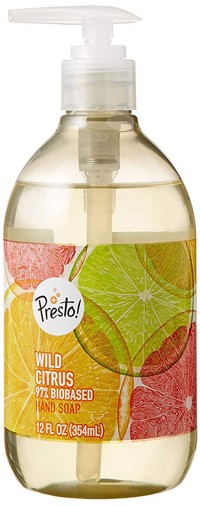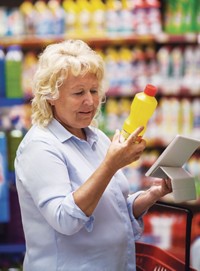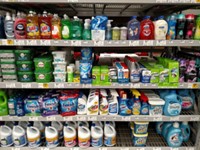Advertisement
Grab your lab coat. Let's get started
Welcome!
Welcome!
Create an account below to get 6 C&EN articles per month, receive newsletters and more - all free.
It seems this is your first time logging in online. Please enter the following information to continue.
As an ACS member you automatically get access to this site. All we need is few more details to create your reading experience.
Not you? Sign in with a different account.
Not you? Sign in with a different account.
ERROR 1
ERROR 1
ERROR 2
ERROR 2
ERROR 2
ERROR 2
ERROR 2
Password and Confirm password must match.
If you have an ACS member number, please enter it here so we can link this account to your membership. (optional)
ERROR 2
ACS values your privacy. By submitting your information, you are gaining access to C&EN and subscribing to our weekly newsletter. We use the information you provide to make your reading experience better, and we will never sell your data to third party members.
Policy
Naming What's In Cleaning Products
Activists sue companies, saying they must disclose ingredients under 1976 New York law
by Cheryl Hogue
February 18, 2009
Environmental groups on Feb. 17 sued four major makers of household cleaning products to force them to reveal the identity of their ingredients.
The activists are asking a New York state court to require disclosure by Church & Dwight, Colgate-Palmolive, Procter & Gamble, and Reckitt Benckiser under a 1976 state law that has never been enforced.
But the law remains in effect and companies are obligated to comply with it, says Keri N. Powell, an EarthJustice attorney representing the six environmental groups filing the suit. EarthJustice is a nonprofit environmental law firm.
The groups say they will use the ingredient lists to inform the public about toxic chemicals in cleaning products that may pose a threat to human health and to the environment. "People deserve to know whether the products they use to wash their dishes, launder their clothes, and clean their homes could be harmful," Powell says.
The law requires manufacturers of cleaning products to list the substances in each of its cleaning products sold in New York and to describe any health and environmental research by the company on those chemicals. This information is to be sent twice a year to the state Department of Environmental Conservation.
The Soap & Detergent Association (SDA), whose members include the four companies being sued, says the suit uses an "arcane" law "to disparage cleaning product formulators whose products are used safely and effectively by millions of people every single day." Calling the case "unfounded," the industry group says the activists lack the legal status to sue the companies under the New York law.
SDA and two other consumer product groups recently announced an initiative to provide more information about ingredients, either on product labels or on company websites (C&EN, Jan. 26, page 13). This voluntary program, says Michelle Radecki, SDA's general counsel, "will provide more meaningful information on ingredients, in a more consistent, easy-to-understand format that will help consumers make informed decisions about the products they use."
But the activists say the voluntary industry program doesn't replace the state law.
The environmental groups contacted the four companies named in the suit and asked them to comply with the New York law, Powell says. The four either refused or ignored the request, she says.
But five other cleaner manufacturers contacted by the activists have submitted product ingredient information to New York authorities, Powell says. They are Method; Seventh Generation; Weiman Products, whose line includes Wright's Silver Cream; Prestige Brands, the company behind Comet and Spic and Span; and Sunshine Makers, maker of Simple Green.
Powell acknowledges that the companies may have claimed the identity of some of their ingredients as proprietary. Names of chemicals claimed as trade secrets would not be made available to the public, she says, although state officials would have access to this information.
New York enacted the 1976 law as the state phased phosphates out of detergents, according to Powell. The statute was intended to prevent companies from substituting chemicals that pose a risk to health or to the environment for the phosphates they eliminated, she says.





Join the conversation
Contact the reporter
Submit a Letter to the Editor for publication
Engage with us on Twitter